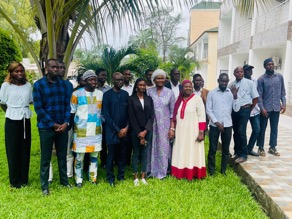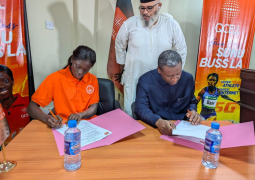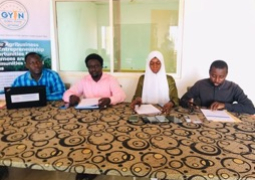
The training held at a local hotel in Kotu, was designed to broaden participant’s knowledge and to increase awareness and understanding of AfCFTA protocols among others.
At the event, Abdoulie Jammeh, Deputy Permanent Secretary at the Ministry of Trade, acknowledged the role of NGO, Civil Society and the Media in the development of any society.
The training, he added, would help participants better understand issues relating to the AfCFTA legal frameworks and implementation processes so as to help The Gambia and her people to effectively participate in the AfCFTA, particularly citizens at the grassroots level, to benefit more from the project.
DPS Jammeh said the capacity building would no doubt help strengthen the active engagement and participation of civil society organisations and the media in the implementation process of AfCFTA.
He spoke of his Ministry’s continuous determination to collaborate with NGOs and the Media so as to build the capacities of these organisations to have a better understanding of the AfCFTA protocols and implementation processes to ensure inclusivity and advocacy for effective implementation of the AfCFTA protocols.
The AfCFTA Agreement, he added, is one of the single most ambitious undertakings made by African Union in advancing the cause of African Regional Integration Project since the launch of the Agenda 2063.
The project was aimed at boosting intra-African trade to promote economic growth, structural transformation and industrialisation of African economies, leading to increased productivity, job creation, and higher value-added exports among African countries.
The Gambia, he said, has continued to participate effectively in the negotiations organised both at the ECOWAS and AfCFTA levels to address issues relating to the Protocol on Trade in Goods and the Protocol on Trade in Services, as well as Phase two related protocols on Competition and Intellectual Property Rights.
He also spoke about some of the achievements made by the Trade Ministry thus far such as the establishment of a National AfCFTA Implementation Committee, which he said, would serve as high-level Inter-Ministerial Committees comprising MDAs, the private sector, and the civil society.
"The main objective of the strategy is to leverage deeper integration within Africa to maximise welfare gains and food security, boost trade and investment, and support structural transformation and industrialization to enhance employment and business opportunities for The Gambia’s growing population. The Strategy is therefore the national strategic framework for the implementation of the AfCFTA in The Gambia and it identifies priority actions that will be undertaken by the government over 10 years from 2020 to 2030 to effectively realize the potential benefits of the AfCFTA." he said.
Modou Lamin Sowe, a participant from TANGO acknowledged the effort of the Ministry in engaging stakeholders on AfCFTA legal framework.
Yusuf Taylor, a media practitioner, also expressed similar sentiments. He commended the Ministry for such initiative as media play a crucial role in the development of the country.




